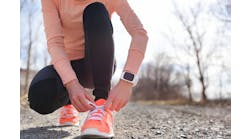Young doctors are super depressed. Here’s how Fitbit can help.
What would happen if you took a group of healthy, young people and subjected them to months of sleep deprivation, piles of work, extreme pressure to succeed and hazing from superiors and peers? Oh, and during that time, a single mistake could mean the difference between saving a life or inadvertently killing someone.
That’s basically what happens for thousands of Americans each during their medical internship.
After medical school, which itself is super stressful, graduates spend about two years practicing under supervision at a hospital. Reports have shown that many of them face depression, anxiety, and other mental health issues.
University of Michigan researchers have been studying the problem for more than a decade, enrolling over 2,000 medical interns from schools around the country every year, then studying how they fare over time.
“During the first year of training, rates of depression goes up, risk of suicide goes up, anxiety goes up and part of what we’re studying is why that is and who’s at risk and what environmental elements put them at risk,” said University of Michigan’s professor of depression and neurosciences Srijan Sen, in an interview with CNBC.
The problem seems to start in medical school, where a survey found that roughly 10% of students had thought about killing themselves within the previous year. This population also suffers from suicide at rates 15% to 30% higher than the general population. It continues, and for some gets a lot worse, during the internship.
“We find that many of the interns start out fine and about half get depressed by the end of the year,” said Sen.
Now the study is getting a technology boost. The interns are getting a Fitbit.
Fitbit got involved with the study through its own research efforts, which involve looking at consumer-generated data for signals of depression. The company thinks its data could be useful in analyzing things like sleep interruptions and varying activity levels, which might contribute to mental health problems. If an intern is running on particularly low levels of sleep and exercise, a Fitbit could pick it up.
The Michigan researchers are also working with a start-up called Mindstrong Health, which is looking at how smartphones can be used to diagnose and treat mental health disorders. An example of that might be the ways that these interns interact with the keyboards on their smartphones.
For now, the researchers aren’t intervening. Instead, they’re trying to figure out what kinds of feedback would be most valuable, such as letting the participants know that they slept less on average this week than the previous one. That might prompt them to get a little more sleep. “What we want to do is provide them with tools to help themselves,” said Sen.
The ultimate goal is to use the latest technologies to figure out who’s most at risk and design the right kinds of interventions, which don’t invade personal privacy. Fitbit could also benefit as it looks to move from consumer wellness to helping people with diagnosed medical conditions, including mental health conditions.

